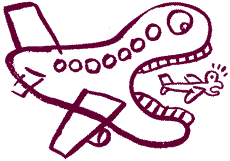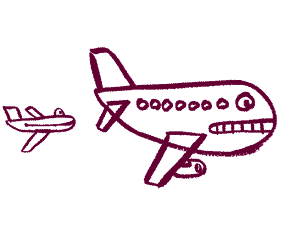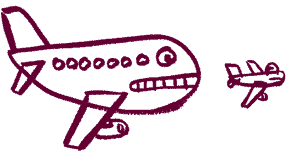Airline Deregulation's Fair-Weather Friends
The last thing the major airlines want is real competition.

Two decades after Congress first deregulated the airline industry, America's major airlines are starting to sound more than a bit like St. Augustine: "Give us competition, Lord! But not yet!"
The drive to freeze out competition can be seen most obviously in the new mergers and alliances that are shrinking the number of airlines serving any one airport. American Airlines is trying to get European Commission approval for an alliance with British Airways, while Northwest Airlines--already partnered with Dutch airline KLM--recently announced plans for an alliance with Continental Airlines. (Alliances provide many of the benefits of mergers--added routes, global connections, oligopoly pricing--without a lot of the costs. In a different age, they might have been called minicartels.) And it seems likely that the next few years will see a continued industry consolidation.
Less obvious but more telling evidence of the majors' resistance to real competition can be found in their massive lobbying efforts to protect their current positions. Those efforts are needed because, despite the seemingly inexorable drive toward oligopoly in the industry, low-priced competitors keep springing up to try to take away their business. The model for these startups is the remarkable success of Southwest Airlines. It has been able to turn flights that are low on frills but high on goofiness (flight attendants singing, dumb contests, and all the rest) into a gold mine by keeping costs low and poaching the majors' business on particular routes. Across the country, airlines such as Reno Air and Legend Airlines are trying to carve out regional niches within which they can challenge the industry giants.
One way to deal with these annoying little gnats is simply to acquire them, though that runs the risk of bringing the antitrust bloodhounds snooping around. Another option is to turn them into "feeder airlines," which allow the majors to offer service from major hubs to smaller airports. The third choice is simply to freeze the upstarts out by keeping them off the runways--and the majors have most takeoff and landing slots at good-size airports safely within their grasp.

At O'Hare Airport, for instance, American and United Airlines together control 87 percent of flights. Northwest and Continental together will own 80 percent of the air traffic at Detroit and 83 percent at Minneapolis. Delta Air Lines enjoys a dominant position in Atlanta, and American has a near monopoly on Dallas-Fort Worth. There is a certain logic to this arrangement--with the number of passengers flying to any one location relatively limited, engaging in cutthroat competition in every city makes less sense for the majors than parceling out the nation among themselves. And most airlines do fly to nearly ever major city, though perhaps not exactly when you want them to.
However much sense the hub system makes from a market-protecting angle and as an efficient means of routing air traffic, its anti-competitive consequences are undeniable. While deregulation undoubtedly has been a good thing overall, and while super-saver fares are often astonishingly low, the last few years have seen a dramatic rise in the price of tickets purchased without any advance notice (what they call business fares, since only business travelers can afford them). By some accounts, business fares are as much as 30 percent higher than they were just two years ago.
That's not because it's become more expensive to carry business passengers, either. In fact, since ticketing systems have become more sophisticated, airlines can do a much better job of managing demand and filling seats. But those savings have not been passed along to customers. Instead, since the supply of airline seats is limited, as demand rises the airlines are able to charge passengers more--at least those passengers who absolutely, positively have to be in Tampa tomorrow.
In theory, of course, this oligopoly pricing should conjure new airlines into existence, bringing supply more in line with demand and eventually harmonizing fares with costs. But there are a number of things preventing that from happening. In the first place, the creation of frequent-flyer programs has let the rich get richer, in the sense that customers only reap the benefits of those programs if they fly the same airline each time. More importantly, the physical universe limits the number of takeoffs and landings any single airport can handle in a day. The majors have a stranglehold on those slots, and they've invested a lot of energy and money in ensuring that they continue to own them.

There is another choice, which is that entire new airports could spring up, or smaller airports could expand. But here, too, the majors have been vigilant. In Dallas-Fort Worth, for instance, American has fought fiercely against the proposed expansion of Love Field (where JFK's plane landed in November 1963). Since 1979, the so-called Wright Amendment (sponsored by that paragon of legislative propriety, former Speaker Jim Wright) kept airlines from flying out of Love to anywhere but Texas' four neighboring states. Last year, Congress passed a law adding three states to that list and letting small planes (56 seats or less) fly anywhere in the country. Dallas-Fort Worth, backed by American, immediately sued everyone involved, even as American ran newspaper ads warning of "intense congestion," "lots of delays" and, more audaciously, that "the North Texas economy will be less vigorous than it is today." How adding low-fare flights explicitly targeting business passengers was going to cripple the Dallas economy was not made precisely clear.
What the Love-Fort Worth fight has made clear is the basic disingenuousness of the majors when it comes to deregulation. While they have pushed hard for "open skies" policies in Japan and Europe and lobbied hard against government antitrust intervention, they have been more than happy to use the legislative process to protect what amount to sinecures. The Love Field imbroglio, in fact, has presented the curious spectacle of House Majority Leader Dick Armey arguing that increased competition will threaten the region's economic health, an odd conclusion from Congress' most fervent supporter of free markets.
Still, the disingenuousness is, in a sense, inherent in the industry itself, since airlines rely on public airspace and, for the most part, public airports for their business. And this makes the whole question of what constitutes regulation a complicated one. One solution being proposed, for instance, would take some landing and takeoff slots at major airports away from the industry giants and auction them off to smaller, low-fare airlines. Now, is that deregulation, or is it re-regulation? The majors insist it's the latter. But insofar as dispersing the slots would foster competition, a strong case can be made that it's the former. Either way, it's a plan that makes sense.
Because air space is limited, there's an inclination to believe that airlines are natural monopolies or oligopolies and that flooding the market with competitors will actually make air travel less, not more, efficient. But the vast majority of airports are a long way from being saturated in terms of possible routes, and whenever low-fare carriers arrive, costs quickly drop. More to the point, even as the major airlines have been reaping large profits over the last four years, their productivity has not risen at all, suggesting that consolidation is not improving efficiency. It's no surprise that the majors want open skies when it suits them and closed skies when it doesn't. But real competition should be the 20th-anniversary gift bestowed on these fair-weather friends of deregulation.